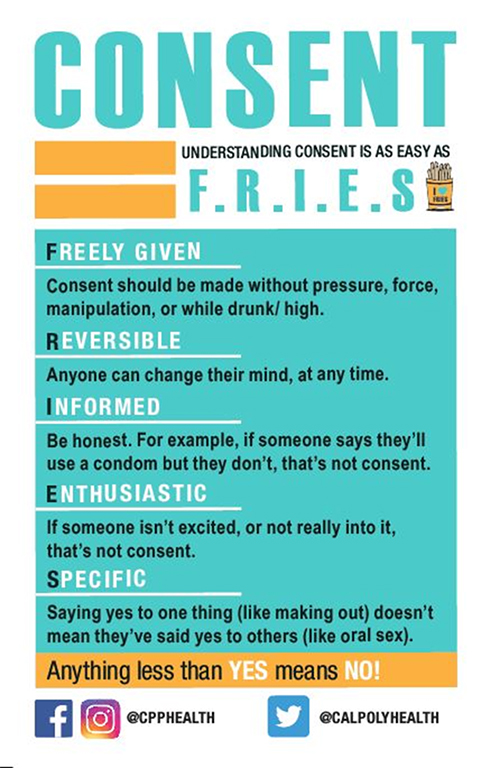Communication
- Sexual consent is when people agree to sex without pressure or manipulation.
- It’s important to talk about boundaries and what people want to do and do not want to do.

It can be uncomfortable to talk to your partner(s) about getting tested or their history with STIs but it’s important to have this conversation BEFORE you start having sex, including oral sex. Here are some ways to start the conversation:
“This is hard for me to talk about, but I care about you and I think it's important. How do you feel about going to get tested for STDs together?”
“FYI, I got tested for STDs last month and I didn’t have anything. Have you ever been tested? I want us to make sure we’re taking care of each other.”
“I think it’s important to be honest, so I want to tell you that I got tested for STDs last month and found out I had chlamydia. I took medicine, and I don’t have it anymore. But it showed me how common and sneaky STDs are. Have you ever been tested?”
Source: Planned Parenthood
Everyone has boundaries, which can be shaped by personal values, beliefs, experiences, and levels of comfort. Levels of comfort and values change, therefore boundaries can also change.
It can take time to learn your own boundaries or your partner’s boundaries. Setting boundaries is a vital part of any relationship. It helps others know what to expect and ensures safety, respect, and understanding within a relationship.
Here are several areas where boundaries apply, in terms of sexual health:
- Physical boundaries: personal space, limitations on touch, nudity, etc.
- Mental boundaries: thoughts, values, opinions
- Emotional boundaries: feelings and responsibilities to yourself and others
- Sexual boundaries: comfort level with sexual touch and activity
Sex can be really great but there are a few things that someone may want to consider to help make their sexual experience even better!
Personal values. Reflect on your feelings about who you are, your boundaries and what you’re comfortable doing.
Commitment. Do you want to be in a committed relationship before having sex? Is this important to your partner(s) too?
Pressure. Are you interested in having sex? Are you feeling pressured? You shouldn’t have sex if you aren’t interested in or are feeling pressured to have sex.
Consent. Sexual consent is when people agree to sex without pressure or manipulation. It’s important to talk about boundaries and what people want to do and do not want to do. Did you give and get consent before engaging in any form of intimacy?

Honesty. Being honest is important in any relationship, but it’s especially important in a sexual relationship. Are you being honest to yourself and to your partner(s)?
STI Testing. Have you or your partner(s) had oral, vaginal or anal sex in the past? Getting tested can help prevent the spread of sexually transmitted infections (STIs). Check out this link to learn more about STIs, testing, and latex barriers.
Protection. Are you using protection? Do you know how to use protection correctly? If you’re having vaginal sex, use birth control and condoms to protect against pregnancy and STIs. If you’re having anal and/or oral sex, condoms and dental dams to help prevent STIs. Talk with your partner(s) about how you can make sex safer.
Communicate. Have you talked to your partner(s) about consent, protection and your values surrounding sex?